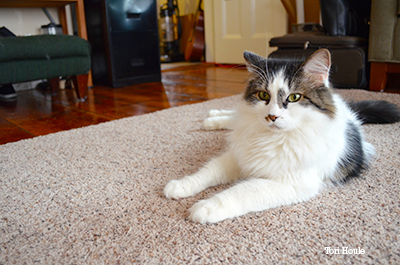Do Cats Get Hypothyroidism?
Hypothyroidism, when the thyroid gland is underactive, is an endocrine disease where the body fails to produce enough thyroid hormone. The hormones tetraiodothyronine (T4) and triiodothyronine (T3) are important to help maintain normal metabolism and bodily functions. Without these thyroid hormones, clinical signs of lethargy, weight gain, hair loss, inactivity, excessive shedding, cold intolerance, and even neurologic signs can be seen. While hypothyroidism is very prevalent in dogs (with a reported incidence of 1 to 3 dogs out of every 500 being affected)1, it is extremely rare in cats.
If your cat was just diagnosed with hypothyroidism, confirm with your veterinarian, as most of the time, it’s hyperthyroidism.
When do we see hypothyroidism in cats?
Hypothyroidism in cats is typically seen secondary to treatment for hyperthyroidism; it can occur after surgery is performed (a bilateral thyroidectomy) to remove the overactive thyroid glands or from radioactive iodine therapy (called I-131). Note that hyperthyroidism can also be treated with an oral medication called methimazole, but we rarely see hypothyroidism from this form of treatment.
Note that hyperthyroidism can also be treated with an oral medication called methimazole, but we rarely see hypothyroidism from this form of treatment.
(Note: If your cat was just diagnosed with hyperthyroidism, don’t worry about the rare likelihood that hypothyroidism will develop as a secondary side effect from treatment. Thankfully, when this does occur, it is relatively transient and doesn’t typically require therapy. That’s because extra thyroid tissue [called “accessory”] in the neck and chest cavity can make up for the low thyroid levels and actually produce adequate amounts of thyroid hormone to compensate.)
Clinical signs of hypothyroidism in cats include:
- Weight gain
- Unkempt hair coat
- Flaky hair coat
- Matting of the fur
- Hair loss on the ears
- Lethargy
- Obesity/weight gain
Diagnosis of hypothyroidism in cats is typically based on measurement of thyroid hormones: low T4 levels can be suggestive of hypothyroidism. That said, if your cat is sick, note that T4 levels can be “falsely” low just from the sickness itself. When in doubt, your veterinarian can do more extensive thyroid hormone testing (including blood tests to look at free T4, total T4, total T3, and TSH).
While treatment for hypothyroidism in dogs includes oral thyroid hormone supplementation (e.g., levothyroxine), this is less commonly done in cats as the hypothyroidism is typically transient. That said, if your cat is showing excessive clinical signs of hypothyroidism (e.g., extreme lethargy, hair loss, etc.), he or she may need oral supplementation for a few weeks to months — based on careful blood work monitoring with your veterinarian.
Prognosis of hypothyroidism in cats
The prognosis for hypothyroidism in cats is excellent, and often will resolve on its own. Follow up blood work is necessary at your veterinarian’s office to make sure that the thyroid hormone concentrations are improving on their own, though thyroid hormone supplementation may be needed in some cats for a period of time.
If you have any questions or concerns, you should always visit or call your veterinarian -- they are your best resource to ensure the health and well-being of your pets.
References:
- Day TK. Hypothyroidism. In Blackwell’s Five-Minute Veterinary Consult: Canine & Feline. Eds. Tilley LP, Smith FWK. 2007, 4th ed. Blackwell Publishing, Ames, Iowa. pp. 730-733.
